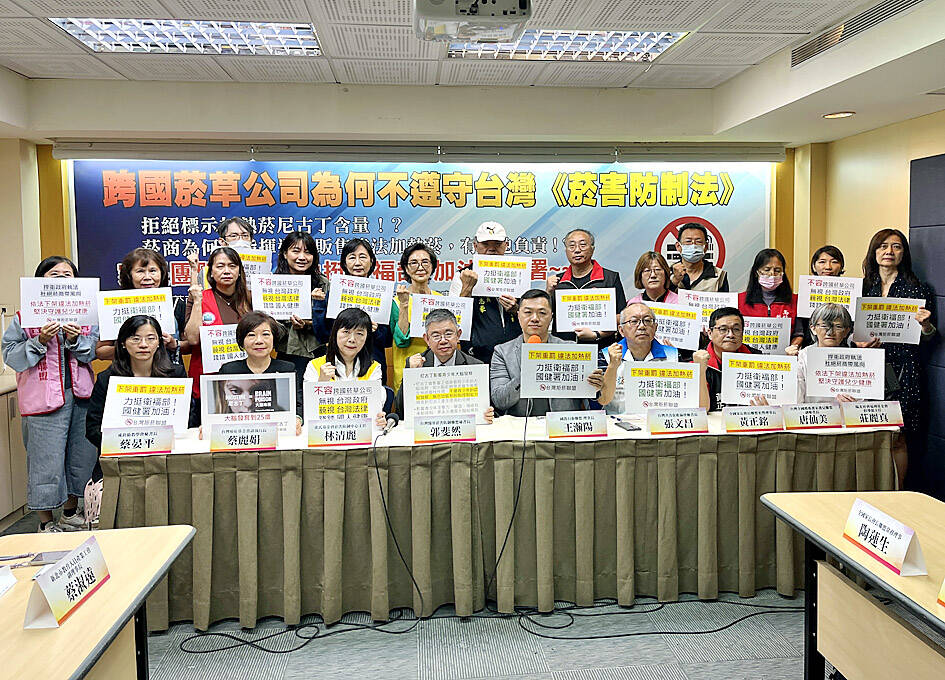Non-governmental organizations (NGOs) yesterday accused a tobacco company of deliberately breaking the law by failing to label nicotine content on heated tobacco products, and urged authorities to step up enforcement after the items were ordered pulled from shelves last week.
Many have asked why the tobacco company would prefer “being fined NT$5 million (US$162,702) rather than labeling the nicotine content and complying with the Tobacco Hazards Prevention Act (菸害防制法),” Lin Ching-li (林清麗), director of the Tobacco Control Division at the John Tung Foundation, said at a news conference in Taipei.
Lin and representatives from 12 other NGOs at the news conference urged tougher enforcement after the Health Promotion Administration ordered eight types of heated tobacco products — all from the same company — pulled from shelves on Friday last week, their first day on sale.

Photo: CNA
The eight products were Taiwan’s first legally approved heated tobacco products to reach the market, but were quickly pulled from shelves after inspectors found the packaging did not list nicotine content as required by law.
Minister of Health and Welfare Shih Chung-liang (石崇良) on Saturday said that the company had submitted samples for review and “the samples were labeled with nicotine content.”
Shih also said authorities are investigating where the process failed, why the products differed from the submitted samples and that fines would be imposed once responsibility is established.
Guo Fei-ran (郭斐然), an attending physician in the Department of Family Medicine at National Taiwan University Hospital, cited a paper last year in the online academic journal Toxics, which examined heated tobacco products sold in nine nations and found that they contained an average of 4.7mg of nicotine per stick.
“That exceeds Taiwan’s legal limit of 1.0mg [per stick],” Guo said, adding that a document published by the tobacco company involved in the case indicated that its heated tobacco products contain 18mg to 20mg of nicotine per gram of tobacco, equivalent to approximately 4.3mg to 6mg per stick.
Describing it as an “unspeakable secret,” Lin said that if the tobacco company complied with the law by labeling nicotine content on heated tobacco, it might not be able to sell its products in Taiwan as they exceed the legal limit.
“Multinational tobacco companies generate about NT$180 billion a year in Taiwan’s tobacco market, so they have money and power,” she said, adding that such resources can “make things go their way,” and making a NT$5 million fine negligible by comparison.
Following their removal from the shelves, some of the heated tobacco products were sent for testing to determine whether their nicotine content meet the stipulated standards.

Taipei, New Taipei City, Keelung and Taoyuan would issue a decision at 8pm on whether to cancel work and school tomorrow due to forecasted heavy rain, Keelung Mayor Hsieh Kuo-liang (謝國樑) said today. Hsieh told reporters that absent some pressing reason, the four northern cities would announce the decision jointly at 8pm. Keelung is expected to receive between 300mm and 490mm of rain in the period from 2pm today through 2pm tomorrow, Central Weather Administration data showed. Keelung City Government regulations stipulate that school and work can be canceled if rain totals in mountainous or low-elevation areas are forecast to exceed 350mm in

EVA Airways president Sun Chia-ming (孫嘉明) and other senior executives yesterday bowed in apology over the death of a flight attendant, saying the company has begun improving its health-reporting, review and work coordination mechanisms. “We promise to handle this matter with the utmost responsibility to ensure safer and healthier working conditions for all EVA Air employees,” Sun said. The flight attendant, a woman surnamed Sun (孫), died on Friday last week of undisclosed causes shortly after returning from a work assignment in Milan, Italy, the airline said. Chinese-language media reported that the woman fell ill working on a Taipei-to-Milan flight on Sept. 22

COUNTERMEASURE: Taiwan was to implement controls for 47 tech products bound for South Africa after the latter downgraded and renamed Taipei’s ‘de facto’ offices The Ministry of Foreign Affairs is still reviewing a new agreement proposed by the South African government last month to regulate the status of reciprocal representative offices, Minister of Foreign Affairs Lin Chia-lung (林佳龍) said yesterday. Asked about the latest developments in a year-long controversy over Taiwan’s de facto representative office in South Africa, Lin during a legislative session said that the ministry was consulting with legal experts on the proposed new agreement. While the new proposal offers Taiwan greater flexibility, the ministry does not find it acceptable, Lin said without elaborating. The ministry is still open to resuming retaliatory measures against South

1.4nm WAFERS: While TSMC is gearing up to expand its overseas production, it would also continue to invest in Taiwan, company chairman and CEO C.C. Wei said Taiwan Semiconductor Manufacturing Co (TSMC) has applied for permission to construct a new plant in the Central Taiwan Science Park (中部科學園區), which it would use for the production of new high-speed wafers, the National Science and Technology Council said yesterday. The council, which supervises three major science parks in Taiwan, confirmed that the Central Taiwan Science Park Bureau had received an application on Friday from TSMC, the world’s largest contract chipmaker, to commence work on the new A14 fab. A14 technology, a 1.4 nanometer (nm) process, is designed to drive artificial intelligence transformation by enabling faster computing and greater power